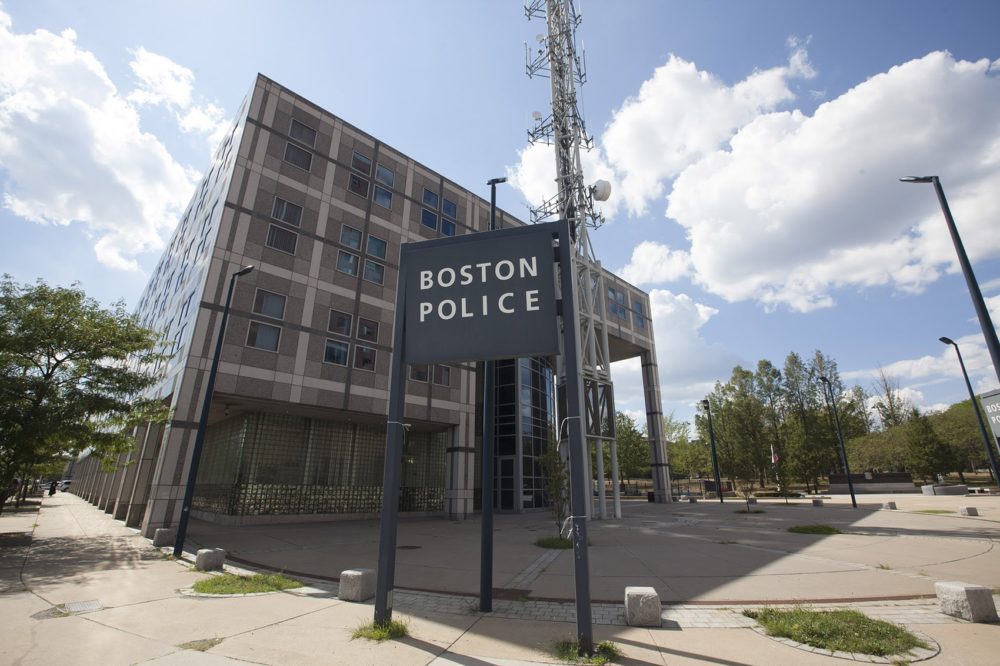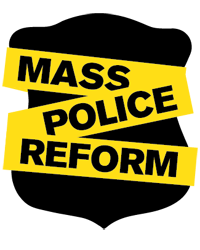
A task force charged with reviewing the Boston Police Department is recommending the city create an independent office with broad investigatory and subpoena powers that could review and resolve civilian complaints and assess Boston police policies.
The Office of Police Accountability and Transparency would replace the existing Community Ombudsman Oversight Panel, which has been criticized for its failure to enact promised reforms or perform proper oversight.
The initial recommendations by the Boston Police Reform Task Force were published Thursday. The group, formed by Mayor Marty Walsh this summer, was led by former U.S. Attorney Wayne Budd and made up of police officers, clergy, community leaders and attorneys.
The report cautioned that these recommendations are just the floor, not the ceiling, on police reform.
“The Task Force offers these recommendations not as an end all list of police reform recommendations, but as a foundation upon which additional work can be done,” the report states. “To bring about meaningful reform to the BPD, reform that is internalized and put in to practice on a day-to-day basis, there is more work to be done.”
Other recommendations include: formalizing and expanding the police department’s commitment to diversity and inclusion; expanding the body-worn camera program to increase transparency and accountability; creating clear and enforceable discipline for violating use of force policies, and holding the department accountable for violations; and maximizing transparency, accountability and public access to police records and data.
The report stresses that the recommendations must be implemented, but also tracked to hold those in power accountable.
“It is not enough that the mayor approve the task force’s recommendations and that the BPD pledge to implement them. The BPD and/or the City must also measure the BPD’s progress and enforce consequences where results are not achieved,” the report says. “To that end, the task force recommends that all of its recommendations be accompanied by accountability metrics, develop a clear set of disciplinary consequences, and issue public status updates.”
And the task force, which only had a few months to compile the recommendations, says there should be a further, more comprehensive study on these issues.
“To bring about meaningful reform to the BPD, reform that is internalized and put in to practice on a day-to-day basis, there is more work to be done.”
BOSTON POLICE REFORM TASK FORCE REPORT
Task force member Jamarhl Crawford, a Roxbury community activist who runs the Blackstonian website, said the recommendations are realistic — though they won’t remove all problem officers and eliminate every issue.
“Will all interactions after this be wonderful? No. But what we hope to do is create a mechanism by which bad experiences can be cataloged, reported, that the data would be open and transparent,” he said. “Under what we have suggested, a person has a better shot at justice and fairness after the fact.”
Walsh, in a press conference Thursday, appeared to be open to the recommendations, but said he’d wait until the final report to weigh in.
“I was very impressed with the work that the committee did,” he said. “Every recommendation — there’s very strong, valid points there.”
Walsh said most of the recommendations can be put into place by the city, but that some — like changes to the civil service hiring and promotions process — will require legislative approval and change. And a small percentage, he said, will require a change in union contracts. The city is currently negotiating a new contract with the Boston Police Patrolmen’s Association, the union that represents most Boston police officers.
When reached by WBUR, the union did not have a comment. A request for comment from police Commissioner William Gross was also not returned.
While not explicitly addressing calls to defund police departments, the report does touch on the possibility of shifting responsibilities from Boston police to other agencies. It says the city must “assess the BPD’s expertise and ability to handle its current responsibilities beyond law enforcement,” and see if other city agencies can take on those responsibilities in whole or in part.
The recommended Office of Policing Accountability and Transparency would include a reconstituted Community Ombudsman Oversight Panel and a civilian review board. The office should review complaints made against the police internal investigations team and also directly investigate complaints about deaths, excessive force, discrimination and perjury. Walsh said Thursday that the recommended office would be staffed by civilians and not located in either City Hall of a police district building.
The task force said the office should also review police policies that may contribute to discrimination, assess hiring and promotion practices, and review the discipline of officers who are Black, Indigenous or people of color.
Unlike the current Community Ombudsman Oversight Panel, the office should have subpoena power to compel the production of documents and witnesses to testify. And the task force said the office’s structure has to have strong leadership and a robust staff to do the work assigned.
Boston police Sgt. Eddy Chrispin, who served on the task force and serves as president of the Massachusetts Association For Minority Law Enforcement Officers, said he hopes the office will create better relationships between police and the people they serve.
“I think maybe having this office in place will have people trust more in the process,” he said. “And maybe people will discover that we are not a homogeneous group of racist, sexist people who use excessive force against anybody who doesn’t look like us.”
Boston City Councilor Andrea Campbell said the reforms seem like a step in the right direction. But she had questions about how the office proposed by the task force gels with a civilian review board proposed in a city council ordinance she is sponsoring and was discussed in a hearing this week.
“Now that we have some proposals on the table by the task force … how do we work out any any differences and get to legislation that we’re all proud of and that ultimately can create what community has been looking to create for decades, which is a civilian review board that holds the department accountable in instances of misconduct,” she said.
Other organizations, including the ACLU of Massachusetts and Lawyers for Civil Rights, said the recommendations are a good start, but need to go further to address mental health, the use of police officers in schools and the over-policing of communities of color.
“As the task force acknowledges, these recommendations are just a start,” ACLU executive director Carol Rose said in a statement. “It remains to be seen whether they will have real teeth.”
Each of the task force’s broad recommendations are buffered by calls for more accountability and transparency. All of the recommendations, they wrote, should have measurable metrics and disciplinary consequences. Annual reviews should be shared with the public.
Rather than responding to requests for data, the report says Boston police should track and share information about officer misconduct regularly. That includes reports on deaths in custody, use of force, weapons discharges and problem officers.
Crawford, the task force member, said having that data is essential. He quoted the old G.I. Joe cartoon: “Knowing is half the battle.”
“The data is really everything, because that’s where we tell where the problems are,” he said. “They can alert us [through] early warning systems [that] we need to spend some attention here or indicate where training should be. And it can also show us where the good stuff has happened.”
The report is the latest step the city has taken since the killing of George Floyd by police in Minneapolis led to nationwide calls to address systemic racism.
Earlier this summer, Walsh declared racism a public health crisis, and reallocated 20% of the police overtime budget — $12 million — to other areas.
“Our steps in June were not one time responses,” Walsh said Thursday. “These recommendations are not one time actions. The activism should not be a one time thing either. The goal is continue dialogue and improvement. It’s a conversation and we all need to stay engaged in it.”
And Commissioner Gross announced updated use of force policies in June to meet the “8 Can’t Wait” reforms that ranged from banning most chokeholds to reminding officers of their duty to intervene.
But more can be done, the task force said. Clear, forceful disciplinary policies need to be in place regarding use of excessive force. And the policies should directly address race, gender, sexual orientation and other identities that have a disproportionate impact on whether an officer uses force.
“These recommendations are not one time actions. The activism should not be a one time thing either. The goal is continue dialogue and improvement. It’s a conversation and we all need to stay engaged in it.”
BOSTON MAYOR MARTY WALSH
The department should create a list of zero-tolerance offenses that would lead to immediate termination, the task force wrote. Domestic violence should be classified as excessive force, it specified.
The task force also pushed for a greater focus on diversity, inclusion and anti-discrimination practices. The police department needs a policy that addresses recruitment, hiring and retention of people of color, and should hire a chief diversity officer, the task force wrote. The department’s entire racial equity training program — currently a two-hour session for trainees — needs to be overhauled.
To diversify the ranks, Boston Public Schools graduates and those who have lived in the city for more than five years should be given the same hiring preference that veterans are — two points on their overall exam scores. About 86% of current BPS students are non-white.
The year-old police body camera program needs to be better, too, the report says. All uniformed officers should be wearing a camera, and they should be recording during almost all working hours. People recorded by police should have unfettered access to the footage, and the public should be able to request it.
Boston police officers working overtime haven’t been required to wear cameras. And the department has rejected public records requests for footage, including at recent racial justice protests.
The department should create a public records unit, the task force wrote, release records as quickly as possible, and acknowledge when they fail to do so.
Walsh urged everyone to read the recommendations and attend a public listening session on Tuesday, Sept. 22 at 4 p.m., where the task force will hear input on the initial recommendations. The public could also submit input via Google forms beginning Sept. 14. (Find more information about providing feedback here.)
Chrispin, the police sergeant and task force member, said he wants more young people in Boston to weigh in on the recommendations.
“This can’t be a dialogue that just takes place between the far right who says, ‘Back the blue at all costs,’ and those who are on the far left who say, ‘Abolish the police.'”
Final recommendations and potential adoption will come after that last listening session.
Read the recommendations in full
With reporting from WBUR’s Khari Thompson and Hannah Chanatry.
